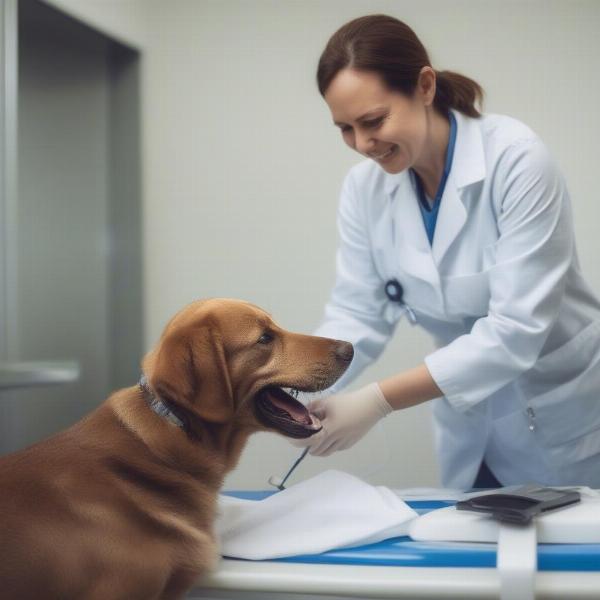Dog panting while sleeping can be concerning for owners. While some panting is normal, excessive or unusual panting can indicate an underlying issue. Understanding the reasons behind your dog’s panting during sleep is key to ensuring their well-being. This article will delve into the common causes, when to worry, and what steps you can take to help your furry friend.
Understanding Normal Dog Panting
Panting is a natural cooling mechanism for dogs. Unlike humans who sweat all over their bodies, dogs primarily regulate their temperature through panting. This rapid, shallow breathing helps evaporate moisture from their tongues and lungs, dissipating heat. It’s perfectly normal for a dog to pant after exercise, on a hot day, or when they’re feeling anxious.
Why Do Dogs Pant While Sleeping?
While some panting can carry over from wakefulness, especially if your dog was recently active or the room is warm, persistent panting during sleep warrants further investigation. Here are some potential causes:
- Temperature: A warm room or thick blankets can make your dog overheat, leading to panting during sleep. Ensure their sleeping area is cool and well-ventilated.
- Dreams: Just like humans, dogs dream! If your dog is experiencing an exciting or active dream, they may pant in their sleep. This is generally harmless and will subside once they wake up.
- Pain or Discomfort: Panting can be a sign of pain or discomfort. If your dog is injured or suffering from a medical condition, they may pant more frequently, even while sleeping.
- Respiratory Issues: Conditions like pneumonia, bronchitis, or heart disease can cause difficulty breathing and lead to panting. If your dog’s panting is accompanied by coughing, wheezing, or other respiratory symptoms, seek veterinary attention immediately.
- Anxiety or Stress: A stressful environment, separation anxiety, or changes in routine can cause increased anxiety, resulting in panting. Creating a calm and predictable bedtime routine can help alleviate stress.
- Medication Side Effects: Certain medications can cause panting as a side effect. Consult your veterinarian if your dog recently started a new medication and is experiencing increased panting.
When to Worry About Dog Panting While Sleeping
Occasional, mild panting during sleep is usually not a cause for concern. However, if you notice any of the following, it’s crucial to consult your veterinarian:
- Excessive panting: If your dog’s panting is unusually rapid or heavy, it could signal a serious problem.
- Labored breathing: Struggling to breathe, gasping for air, or making unusual noises while breathing are signs of respiratory distress.
- Changes in gum color: Pale or bluish gums can indicate a lack of oxygen.
- Lethargy or weakness: If your dog seems unusually tired, weak, or unwilling to move, it could be a sign of illness.
- Other symptoms: If panting is accompanied by vomiting, diarrhea, loss of appetite, or any other unusual symptoms, seek veterinary care.
What to Do If Your Dog is Panting While Sleeping
If your dog’s panting concerns you, follow these steps:
- Assess the environment: Ensure the room is cool and well-ventilated. Remove any excessive bedding.
- Observe for other symptoms: Note any other unusual behaviors or symptoms your dog is exhibiting.
- Contact your veterinarian: Describe your dog’s symptoms and schedule an appointment for an examination.
- Follow your veterinarian’s recommendations: They may recommend tests or treatments to address the underlying cause of the panting.
 Vet examining a dog that is panting
Vet examining a dog that is panting
Conclusion
While dog panting while sleeping can be normal, it’s essential to understand the potential underlying causes and recognize when it’s time to seek veterinary care. By being observant and proactive, you can ensure your furry friend’s health and well-being. Monitoring your dog’s panting while sleeping is an important part of responsible pet ownership.
FAQ
- Is it normal for my dog to pant a little while sleeping? Yes, some panting can be normal, especially if the room is warm or they had a recent active period.
- When should I be concerned about my dog panting while sleeping? If the panting is excessive, labored, accompanied by other symptoms, or your dog seems distressed, contact your veterinarian.
- What can I do to help my dog stop panting while sleeping? Ensure a cool sleeping environment, try to reduce stress, and consult your veterinarian for underlying medical issues.
- Can dreams cause my dog to pant in their sleep? Yes, dogs dream, and active dreams can cause panting.
- Could my dog’s panting be a sign of pain? Yes, panting can be a symptom of pain or discomfort. Consult your veterinarian for a proper diagnosis.
- What are some serious medical conditions that can cause panting? Respiratory issues, heart disease, and other medical conditions can cause panting.
- What should I tell my veterinarian about my dog’s panting? Describe the panting (frequency, intensity), any accompanying symptoms, and any recent changes in your dog’s behavior or environment.
About ILM Dog: ILM Dog provides expert advice on all aspects of dog care, from breed selection and health to training and nutrition. We are dedicated to helping dog owners worldwide provide the best possible care for their furry companions. Whether you’re looking for guidance on dog breeds, health concerns, or training tips, ILM Dog offers valuable resources to support your journey as a pet parent. For expert advice, contact us via email at [email protected] or call us at +44 20-3965-8624.